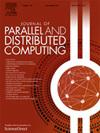Schedule multi-instance microservices to minimize response time under budget constraint in cloud HPC systems
IF 3.4
3区 计算机科学
Q1 COMPUTER SCIENCE, THEORY & METHODS
引用次数: 0
Abstract
In the emerging microservice-based architecture of cloud HPC systems, a challenging problem of critical importance for system service capability is how we can schedule microservices to minimize the end-to-end response time for user requests while keeping cost within the specified budget. We address this problem for multi-instance microservices requested by a single application to which no existing result is known to our knowledge. We propose an effective two-stage solution of first allocating budget (resources) to microservices within the budget constraint and then deploying microservice instances on servers to minimize system operational overhead. For budget allocation, we formulate it as the Discrete Time Cost Tradeoff (DTCT) problem which is NP-hard, present a linear program (LP) based algorithm, and provide a rigorous proof of its worst-case performance guarantee of 4 from the optimal solution. For microservice deployment, we show that it is harder than the NP-hard problem of 1-D binpacking through establishing its mathematical model, and propose a heuristic algorithm of Least First Mapping that greedily places microservice instances on fewest possible servers to minimize system operation cost. The experiment results of extensive simulations on DAG-based applications of different sizes demonstrate the superior performance of our algorithm in comparison with the existing approaches.
在云高性能计算系统中,调度多实例微服务以在预算限制下最小化响应时间
在新兴的基于微服务的云高性能计算系统架构中,一个对系统服务能力至关重要的具有挑战性的问题是,我们如何调度微服务以最小化用户请求的端到端响应时间,同时将成本保持在指定的预算范围内。对于单个应用程序请求的多实例微服务,我们解决了这个问题,据我们所知,这些应用程序没有已知的现有结果。我们提出了一个有效的两阶段解决方案,首先在预算约束内为微服务分配预算(资源),然后在服务器上部署微服务实例以最小化系统操作开销。对于预算分配问题,我们将其表述为np困难的离散时间成本权衡(DTCT)问题,提出了一种基于线性规划(LP)的算法,并从最优解给出了其最坏情况性能保证4的严格证明。对于微服务部署,我们通过建立其数学模型,证明了它比一维绑定包装的np困难问题更难,并提出了一种启发式的最小优先映射算法,该算法将微服务实例贪心地放置在尽可能少的服务器上,以最小化系统运行成本。在不同规模的基于dag的应用程序上进行了大量的仿真实验,结果表明,与现有方法相比,我们的算法具有优越的性能。
本文章由计算机程序翻译,如有差异,请以英文原文为准。
求助全文
约1分钟内获得全文
求助全文
来源期刊

Journal of Parallel and Distributed Computing
工程技术-计算机:理论方法
CiteScore
10.30
自引率
2.60%
发文量
172
审稿时长
12 months
期刊介绍:
This international journal is directed to researchers, engineers, educators, managers, programmers, and users of computers who have particular interests in parallel processing and/or distributed computing.
The Journal of Parallel and Distributed Computing publishes original research papers and timely review articles on the theory, design, evaluation, and use of parallel and/or distributed computing systems. The journal also features special issues on these topics; again covering the full range from the design to the use of our targeted systems.
 求助内容:
求助内容: 应助结果提醒方式:
应助结果提醒方式:


